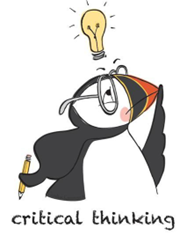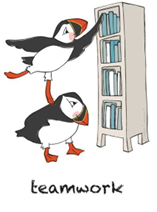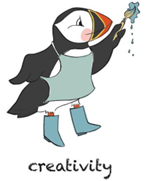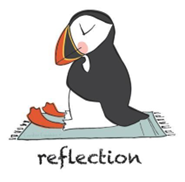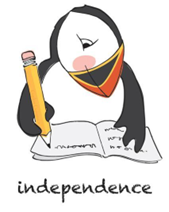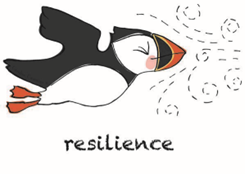Our Puffling Learning Powers
|
|
CRITICAL THINKINGIn a nutshell: using curiosity to ask well-structured questions and challenge what they observe and already believe about the world to generate deeper thinking and learning through disciplined reasoning and ethical enquiry. |
- have an irrepressible desire to find things out and are always on the lookout for links and patterns (both similarities and differences) in their learning
- pursue links between what they are learning and what they already know, what they learn at school and at home, or what they are learning in different parts of the curriculum.
- can construct simple questions about ideas and actively pursue their own ‘truth’ to make sense of the world
- can give reasons for an opinion and understand opposing viewpoints
- engages in spontaneous wonderings!
- accepts that not all questions have a clear answer and like to come to their own conclusions about things as a result of enquiry
|
|
TEAMWORKIn a nutshell: learning from and with others by listening, encouraging, communicating and adopting different roles to work towards a group goal that is greater than the individual achievements of its members.
|
- can work collaboratively to achieve more
- can learn from and with others
- can listen to and respond to others’ ideas
- knows that a shared plan will lead to more successful outcomes
- can encourage, support and empathise with team mates
- makes choices which contribute to their team’s goal
- can help to solve team conflict or disagreements
|
|
CREATIVITYIn a nutshell: using imagination and inventiveness to create something original (to the learner) by combining and linking existing knowledge and ideas in a novel and beneficial way to turn them into reality. |
- can generate lots of ideas in solution to a problem
- can look at things in different ways
- can make links between different ideas
- can think imaginatively to create a product of value
- enjoy playing with ideas and are receptive to hunches and inklings that are at the edges of their thinking
|
|
REFLECTIONIn a nutshell: consciously and actively examining and thinking about our experiences, behaviours, feelings, beliefs and attitudes in order to learn from them and take responsibility for our personal growth. |
- can identify themselves as a learner
- can identify their own strengths and weaknesses
- can give reasons for choices which they have made
- can take some responsibility for choices which they have made and for their successes and failures
|
|
INDEPENDENCEIn a nutshell: In a nutshell: autonomously taking charge of their own learning by planning what to do, when to do it and what support or resources will be needed to succeed, resulting in high levels of self-motivation and self-regulation. |
- able to work by themselves when they know they have the skills and resources to achieve an outcome by themselves
- can make decisions about what to do
- will ask for help after trying strategies to help themselves
- can be self motivated
- can recognise, manage and minimise distractions
- are comfortable making their own decisions and organising and selecting appropriate resource
- independent learners can tolerate higher levels of uncertainty and ‘not knowing’. The opposite pole is dependency
|
|
RESILIENCEIn a nutshell: keeping going when things get hard as they believe errors and challenge show they are at the edge of their comfort zone which leads to more progress and depth in learning. |
- is willing to take on a challenge and move into their ‘stretch zone’ to ‘give it a go’ even if the outcome or the way to proceed is unclear
- they know that learning is sometimes hard for everyone and therefore, have a high level of ‘stickability’.
- has a range of strategies for getting ‘unstuck’
- they understand that mistakes are how we learn and therefore see them as an opportunity.
- can tolerate some uncertainty and can understand and tolerate the uncomfortableness experienced at the edge of their comfort zone.
- they can tolerate feeling confused or slightly anxious and can ‘hang in there’ when the going gets tough
- can persevere

